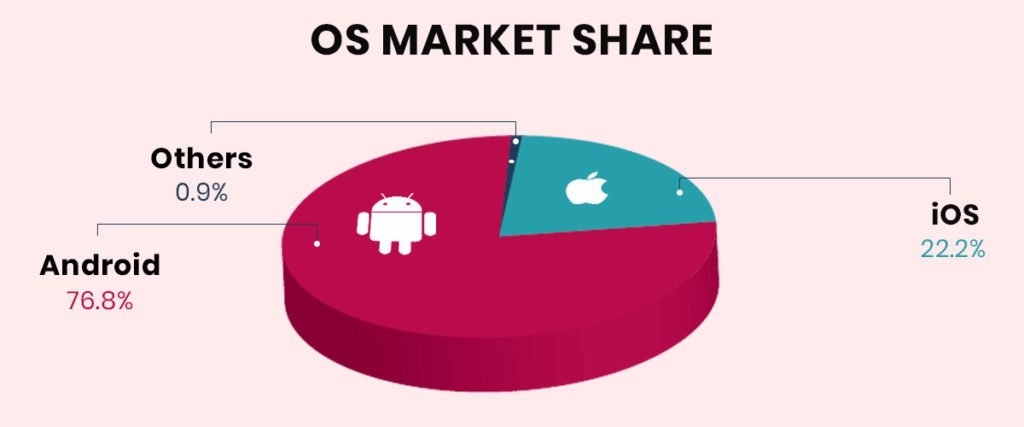
So, you have come up with an app idea. You even have a monetization strategy. But you don’t have enough time and budget to launch that idea for both the app development platforms (iOS & Android). Now, you are scratching your head which one to go first where you could avail maximum benefit from your app idea. So, which one to choose first? iOS or Android?
As per the latest statista’s report, the mobile app OS market share is divided between two major platforms. iOS and Android. Where Android takes a huge lead by taking over 76.08% market share to its name. On the flip side, its nemesis iOS has 22.01% of the share.

You have already decided to go with Android! Haven’t you?
Don’t rush without knowing all aspects of both the platforms. Android, of course, has a major grip over its popularity but iOS has its unique audience who have been loyal to Apple for a long time. Even, if we look at the revenue, then iOS still leads ahead from Android despite having low app downloads. According to the SensorTower App store generated $14.2 billion as compared to $7.7 billion of Playstore.
We have gathered some interesting data that would help you out in deciding which platforms to go first for your business app or startup. Let’s get started.
Demographics & Audience
What do you think will happen, if your app market is in Asia and you have built an app on the iOS Platform?
Without a doubt, your app will tank. Reason? In Asia, 85.9% of users prefer Android powered devices as compared to 12.69% of iOS.
So, figuring out an inclination of people of different demographics help you decide which platform will give better traction for the app.
Countries like the US, Canada, Australia, and the UK has a high percentage of IoS device users than Asia and other Europian countries. Android on the other enjoys its loyal userbase in Asian countries and Eastern European countries.
Development Speed
Apple has its own development ecosystem. Every iOS devices and operating system are only made by Apple itself. So their most devices run on the latest operating systems. And if there is any older OS, then it runs on fewer iOS devices. So, developers don’t have to code an app considering various device models and OS.
On the flip side, the Android device market is fragmented. Companies like Samsung, LG, etc, are producing their own devices. So there are tons of new models out there in the market. So the developer needs more time for coding Android apps.
So, keep this in mind, if a mobile app development timeline is your concern, then Android apps may take longer than its counterpart.
Monetization Strategy
If you have plans for monetizing your app through in-app purchases or subscription-based models, iOS should be the first choice as a development platform. Businessofapps’s reports suggest that Apple’s App Store 2018 revenue came to $46.6 billion, while Google Play revenue stood at $24.8 billion. This is very high compared to the play store because the app store had lower app download than its rival.
Android Play store performed better on revenue generated from ads although iOS has a better revenue-generating opportunity. However, Android had seen 19.6% of growth in in-app revenue in the first quarter of 2019. Which is a promising jump as compared to iOS.
Over All Cost
As we have mentioned earlier, android devices are fragmented. Developers need more time to develop a native app for it. And the final cost of app development depends on how much time the app takes to build. The number of hours for Android app development is much higher than the iOS app, hence it will cost you more.
Apart from the development procedure, in the app submission, the App store charges $100 per year for an unlimited amount of apps. Whereas android charges $25 for one app.
Features and Functionality
As we know that, Android is an open-source platform, with its disadvantages like fragmentation, there come some advantages to its side as well. Android gives more flexibility in adding customize features according to multiple devices of multiple brands. You can customize according to your audience’s desire.
However, open-source environment means the Android platform is more prone to malware and low-quality apps.
On the contrary, Apple is more secure than Android. So the platform has more inclination of enterprise clients.
Latest operating system
iOS updates automatically without any involvement of users. While Android OS updates asks permissions. So, most iOS users’ devices are working on the latest operating system. Whereas, the case is different for Android users.
The reason for bringing this fact is that if you have an app idea that heavily depends on hardware and latest OS, then you should consider this. Take, for example, you are building an AI chatbot like Heptik or VR app like IKEA, then you must consider these important aspects.
Check out how users of both platforms are devised among different operating systems.

Is there any other options for developing an app?
There are other options as well if you do not want to go for native app development and budget is your issue. You can go for Hybrid app development or web application approach. Web apps are an inexpensive way to provide your users with an online gateway for your business.
You can build one web app for each platform. More importantly, web apps don’t use the mobile space, unlike native apps.
You can also go for a hybrid app development where you have to build only one app for both the platform. You can save a considerable amount of time and cost if you prefer to go with a hybrid approach.
Conclusion
Selecting the right platform for your app idea or business depends on your requirements. As we have described, it relies on demographics, users’ inclination, latest OS, current share, and budget requirements.
So there is no definitive answer to this question. But yes, if you are targeting the US market with higher education and higher incomes, then iOS would be an ideal choice. On the other side, if you are targeting users all over the world and want to have an ad-based business model instead of In-app purchases the Android should be your prime choice.



